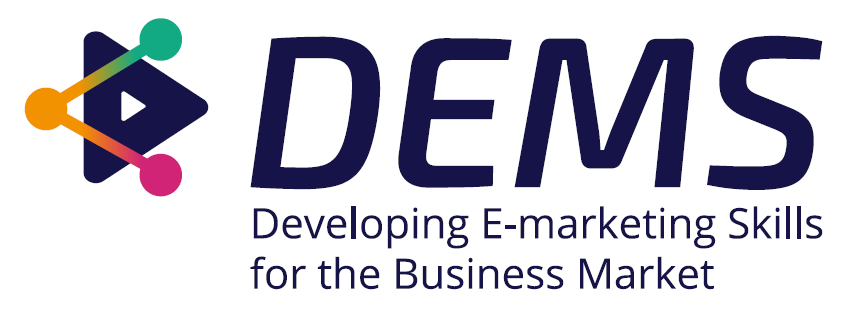Exploratory study
Digital marketing courses
The DEMS project teams conducted an initial exploratory study to identify the areas, themes, and topics that are taught in mainstream digital marketing courses.
The analysis focused on the EDX, Coursera, Digital Marketing Institute, and Udacity platforms for short and medium term courses. It should also be noted that the Lynda and Udemy platforms were also subject to consideration. However, considering that the offerings they contain do not differ substantially from the above, it was decided that they would not be analyzed. The Udemy platform was consulted, with the keyword “digital marketing”, returning more than 10,000 results, and the Lynda platform, for the same search, returned more than 1000 results. All platforms rank their offers according to two criteria, namely duration and level of difficulty.
FINDINGS
- Several main themes are recurrently referred to, these being:
- Digital Marketing Strategy
- Web Content
- Digital Advertising
- Search Engine Optimization
- Social Media
- Analytics
- The medium-term courses, post-graduate courses, and master’s degrees almost invariably include these
subjects. - Bear in mind that, as mentioned, these are major themes. They can include a myriad of sub-themes. As an
example, digital advertising can be subdivided into Display Advertising, Search Advertising, Video Advertising,
Social Media Advertising, Mobile Advertising, Programmatic Advertising, Retargeting, and Native Advertising. - The short courses focus mainly on the topics and subtopics listed above, but additionally, there is a very wide
range of topics in the short courses. - Some of these issues require further thought and research (it should be highlighted that this is the central issue
of the research that will lead to the conception, design and proposal of different typologies of digital marketing
courses).
a. E-commerce
b. Influencers
c. Reputation Management
d. User Experience
e. Inbound and Outbound marketing
f. Customer Relationship Management
g. Web Design
h. Customer Experience (Services)
i. Digital Channels
j. Product Management (digital)
k. Landing pages
l. Conversion Rate Optimization
m. E-Selling - Some medium-duration courses related to analytics require significant knowledge of mathematics and statistics.
- Interesting conclusions can also be drawn about post-graduate and master’s degrees. There is a set of courses
that includes the main themes mentioned above. But the curricular plans are very diversified, where some
curricular plans excel by the absence of essential themes, including themes that do not belong to the sphere of
digital marketing, and we can also find unique marketing topics adapted to digital marketing. It should be noted
that these results should be expected as some of the courses are offered by university institutions. - Finally, it should be noted that the offering of post-graduate and master’s degrees in which the designation is
digital marketing is limited in higher education institutions.

